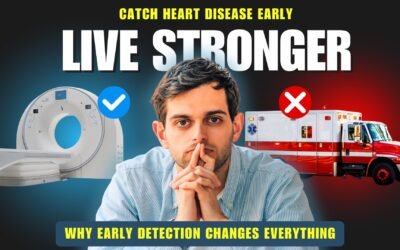Early Detection Saves Lives|Families|The ones you love|Legacies
What if you could know, right now, if a silent threat is hiding inside you?

Heart Scan w/Calcium Score
Your Introduction to Early Detection.

Full Body CT Scan
The Gold Standard for Early Detection.

Long Term Preventive Packages
When you understand that living healthy doesn’t start and stop at a check up.
As featured on
Advanced Body Scan saved my life!
Why choose Advanced Body Scan?
Here's What we can do for you.
- Get the information you need to take control of your health.
- A body scan can be used to detect heart disease, as well as cancer and other abnormalities in the body.
- We use a state-of-the-art CT scanner that can take multiple images of the organs within the time of a single heartbeat, thus providing much more detail.
- Body scans, which are ultra-accurate, extremely fast, and non-invasive, give you information that can save your life.
2020 Fatalities From The Top Causes of Death in the U.S.
Heart Disease
Cancer
Covid-19
If you could prevent a heart attack, would you?
Preventive Screening CAn save Your Life
Advanced Body Scan offers you the latest technology to detect illnesses such as heart disease and cancer months or even years before symptoms may appear to help put YOU in control of YOUR health.
All preventive scans at Advanced Body Scan are performed on the latest imaging technology. The Advanced Body Scan takes only a few minutes and can provide you with the information that can make the difference between years of treatment or simply a change in lifestyle.
If you are up against silent killers, such as heart disease or cancer, early detection can exponentially increase your chances of survival. When you turn to us, you can be confident that your concerns will be handled by highly qualified professionals. Visit us today at one of our locations.
Request your scan now
Patient Stories
Frequently Asked Questions
What can I see on a Full Body Scan?
The specific findings that can be seen on a whole body medical scan will vary depending on the type of scan that is used and the body part that is being imaged. However, some of the most common findings that can be seen on whole body scans include:
- Cancer: Whole body scans can be used to detect cancer at an early stage, when it is most treatable.
- Tumors: Tumors are abnormal growths of tissue. Tumors can be benign (non-cancerous) or malignant (cancerous).
- Inflammation: Inflammation is a condition that causes redness, swelling, and pain. Inflammation can be seen on a scan as an area of increased brightness.
- Abnormalities in bone density: Whole body scans can be used to measure bone density. Bone density is important because it can help to identify osteoporosis, a condition that causes bones to become weak and brittle.
- Abnormalities in the heart and lungs: Some whole body scans are used to detect early signs of deadly diseases such as heart and cancer.
What's the difference between a MRI and Computed Tomography Body Scan?
The main difference between a computed tomography scan like ours and an MRI scan is that the MRI scan cannot image the heart and the vessels around it. Since heart disease is the number one killer of all diseases, it is very important to have a scan that can see early signs of heart disease. Our scan can also see up to 500 different types of cancers. So early detection is the key with an advanced body scan. Advanced Body Scans computed tomography scans are considered the gold standard for imaging the heart. Since heart disease is the number one killer of all Americans, it makes sense to get this scan in lieu of an MRI. Cancer is the second leading cause of death after heart disease. Of all cancers, Lung cancer is number one in deaths. The lungs are another area that MRIs struggle to image. Computed Tomography scans are superior at imaging calcium buildup in the heart and the structures of the lungs for lung cancer.
Other differences between an MRI and a Computed Tomography Scan are comfort and time. Our Advanced scan takes less than 5 minutes. There is no need to change clothes and there are no needles, no prep, and nothing covering your body. With MRI technology, your body is covered in electronics called "coils" These coils remain in place for the entire scan and can be somewhat cumbersome. They can hold heat causing many patients to overheat during scans. Counting the time it takes to attach the coils to your body, the entire process can take upwards of 45 minutes to 75 minutes for the entire MRI process. MRIs also produce an enormous amount of noise, up to 100 decibels, and can be very problematic for people who are subject to claustrophobia.
What can I expect during the scan?
Who should get a Body Scan?
A whole-body Computed Tomography Scan, also known as a CT Body Scan, is a valuable tool for detecting potential health issues at an early stage. You should consider getting a whole-body CT scan if you have individual risk factors such as obesity, environmental exposures, and especially a family medical history of disease. The following individuals may benefit from a whole-body CT scan:
- Asymptomatic Individuals with Risk Factors: People with a family history of certain diseases, such as cancer or heart disease, may consider getting a whole-body CT scan to identify potential early signs or genetic predispositions.
- Smokers and Former Smokers: Current and former smokers are at a higher risk of developing lung cancer and other respiratory issues. A whole-body CT scan can help detect lung abnormalities and identify potential issues early on.
- Individuals with Specific Symptoms: In some cases, individuals experiencing unexplained symptoms, such as persistent pain, weight loss, or other concerning issues, may be advised to undergo a whole-body CT scan to investigate the cause.
- High-Risk Occupational Exposure: Certain professions expose individuals to substances or conditions that may increase the risk of specific diseases. Those with high-risk occupational exposure may consider regular whole-body CT scans as part of their health monitoring.
- Those with Chronic Conditions: People with chronic conditions like autoimmune diseases or chronic infections may consider whole-body CT scans to monitor disease progression and potential complications.
- Individuals with Known Health Conditions: People with certain existing health conditions, such as a history of cancer, heart disease, or kidney problems, may benefit from regular whole-body CT scans to monitor disease progression or detect potential recurrences.
- Those with a History of Environmental Radiation Exposure: Individuals who have received significant radiation exposure in the past, either due to medical treatments or other reasons, may consider whole-body CT scans for ongoing monitoring and assessment.
- Middle-Aged and Older Adults: As people age, the risk of developing various health issues increases. Middle-aged and older adults may choose to undergo whole-body CT scans as part of their preventive healthcare strategy.
- Individuals Considering Lifestyle Changes: People planning to make significant lifestyle changes, such as starting a new exercise routine, quitting smoking, or altering their diet, may consider getting a baseline whole-body CT scan to track improvements in their health over time.
- Athletes and Fitness Enthusiasts: Athletes and those actively engaged in intense physical activities may use whole-body CT scans to assess potential sports-related injuries or monitor their musculoskeletal health.
- Individuals with Concerns about Osteoporosis: Whole-body CT scans can help assess bone density and detect early signs of osteoporosis, a condition characterized by weakened bones.
- Individuals with Unexplained Weight Loss: Sudden and unexplained weight loss could be a sign of an underlying health issue. Whole-body CT scans can help identify potential causes.
- People with a History of Environmental Exposure: Individuals who have lived in or near areas with environmental contaminants or pollutants may opt for whole-body CT scans to assess any potential health risks.
- Individuals Planning Major Medical Procedures: People scheduled for extensive surgeries or organ transplants may undergo whole-body CT scans to assess their overall health status before the procedure.
- Those Seeking Peace of Mind: Some individuals may choose to have a whole-body CT scan simply for peace of mind, especially if they have concerns about their health and want a comprehensive evaluation.
Will I get a Heart Calcium Score
Yes, our scan measures the calcium buildup in your coronary arteries and determines a specific score.
A calcium score from a CT heart scan is a measure of the amount of calcium buildup in the coronary arteries. Calcium buildup is a sign of atherosclerosis, which is a narrowing of the arteries that can lead to a heart attack.
The calcium score is calculated by using a computer to count the number and size of calcium deposits in the coronary arteries. The score is then expressed as a number, with a higher score indicating more calcium buildup.
A calcium score of 0 means that there is no calcium buildup in the coronary arteries. A calcium score of 1 to 10 indicates a small amount of calcium buildup. A calcium score of 101 to 400 indicates moderate calcium buildup. A calcium score of 401 or higher indicates severe calcium buildup.
The calcium score is a useful tool for predicting the risk of a heart attack. People with a higher calcium score are more likely to have a heart attack in the future. However, the calcium score is not a perfect predictor of risk, and other factors, such as age, gender, and family history, also play a role.
A CT heart scan is a relatively painless and noninvasive procedure. It is typically performed in a hospital or imaging center. The patient lies on a table and is injected with a contrast dye. The CT scanner then takes a series of images of the heart.
The calcium score is a valuable tool for assessing the risk of a heart attack. However, it is important to remember that the calcium score is not a perfect predictor of risk. Other factors, such as age, gender, and family history, also play a role. If you have a high calcium score, it is important to talk to your doctor about your risk of a heart attack and how to reduce your risk.
Here are some of the benefits of getting a calcium score:
- It can help to predict your risk of a heart attack.
- It can help your doctor to decide if you need further testing or treatment.
- It can help you to make lifestyle changes to reduce your risk of a heart attack.
Is a body scan painful?
Will I get a consultation?
How long does it take?
Do you take insurance?
Are all Body Scan Companies the same?
Will this affect my insurance or future insurance?
No. Advanced Body Scan does not report your scan results to your insurance company, government health databases, or any outside agencies. Your report of findings is given only to you, and if you request, we can share it with your doctor—but only at your direction.
Because we do not submit these scans to insurance, they do not become part of your medical record in a way that would affect your current or future insurance coverage or rates.
Your health decisions remain private, empowering you to take action without fear of impacting your insurability.
Latest Updates
Catch Heart Disease Early, Live Stronger: Why Early Detection Changes Everything
Heart disease is still number one, and many...
Are Full Body CT Scans Safe? What You Should Know in 2025
If you’re over 30 and want clarity about your health, a full body scan is the fastest way to get it. No stress, no prep, just answers.
At Advanced Body Scan, we’re focused on early detection, not waiting for symptoms.
Alzheimer’s Disease in 2024: A Cause for Action
Do You Know What Brains with Alzheimer's Look...
Preventive Screening Services
Detecting disease early is one of the most crucial factors for effective treatment. As we age, it becomes increasingly more important to make wise health decisions and to take charge of our health to ensure a longer and better quality life.
At Advanced Body Scan, we utilize state of the art technology for accurate detection. Our GE CT scanner is based on the technology of CT scanners, with latest generation technological improvements.
The GE CT scanner is one of the best means of attaining a preventive screening, most notably for the detection of coronary heart disease. It utilizes high speed scanning technology and has the ability to freeze images of the moving heart. It can capture multiple images within the time of a single heartbeat.
Body Scans
Preventive screening services at Advanced Body Scan includes body scans, with which we can detect a wide variety of diseases. These include:
- Pancreatic Cancer: The pancreas is located deep within the body, making early detection through a physical examination impossible. We can detect pancreatic cancer early, providing a greater chance of effective treatment.
- Abdominal Aortic Aneurysm: These can tear or rupture, causing fatal internal bleeding. They can also result in blood clots, blocking blood from flowing into the abdominal organs, kidneys, and legs.
- Thoracic Aortic Aneurysm: The largest blood vessel in your body, the aorta is usually strong but can become damaged over time. A thoracic aortic aneurysm can lead to fatal internal bleeding, and direct blood away from other organs, resulting in stroke, kidney damage, heart attack, and death.
Heart Scans
With our preventive screening services, we can detect a number of heart issues, including:
- Coronary Artery Disease: This is also referred to as “coronary atherosclerosis”, or more commonly as simply “heart disease”. It occurs when arteries responsible for supplying blood to the heart narrow and harden due to cholesterol and plaque buildup.
- Heart Attacks: We can detect signs of a heart attack and their causes, including coronary artery disease, blood clots, and other issues.
We can also provide pericardium, heart size, and heart valve calcification assessments.
Lung Scans
Our preventive screening services can detect a number of health problems in the lungs, including:
- Lung Cancer: This is the uncontrolled growth of abnormal cells in the lungs. Over time, these cells can develop into tumors that disrupt the normal functions of the lungs and spread to other parts of the body (metastasize).
- Emphysema: This disease affects the inner walls of the air sacs within the lungs. Over time, these air sacs can weaken and eventually rupture. This results in large air spaces, rather than many small ones, ultimately reducing the amount of oxygen that can reach the bloodstream.
- Hiatal Hernia: This is a bulging of the stomach into the chest through the opening of the diaphragm, called the “hiatus”.
Virtual Colonoscopy
These are an important part of our preventive screening services. With modern technology, a virtual colonoscopy has never been easier. In fact, this method can provide even better results than the invasive optical scope.
Our GE CT scanner can take multiple images of the colon quickly and efficiently. We can even zoom in on various areas for more detailed study. The procedure usually takes less than fifteen minutes! It involves very little preparation and requires no anesthesia.
With this method, there is zero risk of procedural tear or puncture.
Our minimally invasive, virtual colonoscopy can detect:
- Colon Cancer
- Colon Polyps
- Kidney/Gall Stones
- Abdominal Aortic Aneurysms (AAA)
- Wall Thickening
- Gross Annular Lesion
- Diverticulitis
- Diverticulosis
- Abnormal Growth/Inflammation


















